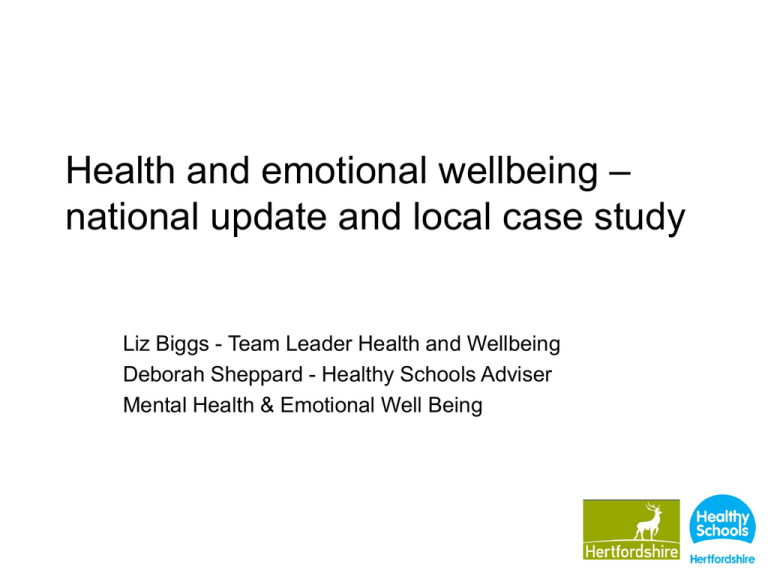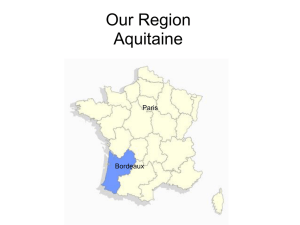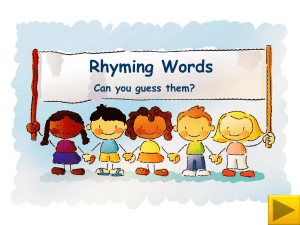
Health and emotional wellbeing –
national update and local case study
Liz Biggs - Team Leader Health and Wellbeing
Deborah Sheppard - Healthy Schools Adviser
Mental Health & Emotional Well Being
Workshop outline
• an update on national policy and strategy
relating to health and wellbeing from both
education and health agendas
• key messages and recommendations from
the Hertfordshire TaMHS project
National context
• White Papers – Education and Health
(November 2010)
• Health and Social Care Bill – 19 January 2011
• Education Bill – 27 January 2011
• Graham Allen Report – 19 January 2011
• Mental Health Strategy – No Health without
mental health – 2 February 2011
• Munro Interim Report – 4 February 2011(final
report May 2011)
• Tickell Report – March 2011
• Ofsted Consultation
The Schools White Paper
•
•
•
•
•
•
•
Education Bill – 4 key themes
Fairness, freedoms, accountability and improving
behaviour
Good schools play a vital role as promoters of health
and wellbeing in the local community and have
always had good pastoral systems. They understand
well the connections between pupils’ physical and
mental health, their safety, and their educational
achievement. They create an ethos focused on
achievement for all, where additional support is
offered early to those who need it, and where the
right connections are made to health, social care and
other professionals who can help pupils overcome
whatever barriers to learning are in their way. Good
schools work with parents, community organisations
and local agencies to create a healthy, safe and
respectful environment in school, after school, and on
the way to and from school.
Teachers, pupils and charities report that prejudicebased bullying in particular is on the increase. It is of
course unacceptable for young people to be bullied
because of their sexuality. Pupils with Special
Educational Needs and disabilities are also more
likely to be victims of bullying.
High quality PE
High quality SRE
High quality PSHEe
The Health White Paper
•
•
Healthy Schools programme to
continue on a sector led and voluntary
basis
Internal review of the guidance to
schools on the teaching of PSHE
– Group of experts to identify non
legislative solutions to tackling low
levels of body confidence
•
•
•
•
Existing food standards maintained
Wider take up of competitive sports
encouraged in schools
National Child Measurement
programme to continue
‘Good schools will be active promoters
of health in childhood and adolescence,
because healthy children with high self
esteem learn and behave better at
school’
Mental Health Strategy
• Six shared objectives to
improve mental health and
wellbeing of the nation
• Emphasis on early intervention
and prevention
• Half of those with mental
health problems first
experience symptoms before
the age of 14
• Reinforces commitments to
Healthy Schools, SRE, PSHE,
school games
• Set in the context of Health
and Wellbeing Boards
The Tickell Report
• Healthy development
• Interrelationship between early
years and health
• Prime areas of learning physical development – health
and self care
• “Developing a healthy
lifestyle is important for
young children in the 21st
century, with increased risks
to their wellbeing associated
with obesity, junk food, and
sedentary lifestyles.”
Ofsted Inspection
•
•
•
How well children are doing at school
How well the school is teaching its
children
How well the school is being run
– Inspectors will also check how well the
people in charge of the school, run
things. They will be especially interested
in how they: make sure the school runs in
a way that helps its pupils to do well and
be safe; They will also check how well the
school works with the parents of its pupils
– They will also check how the people
running the school try to make sure that
all the teaching that happens in the
school is good, and that the school is
doing its best for all of its pupils, not just
some of them. They will check that the
school makes sure each of its pupils has
an equal chance to do well.
– Inspectors will also see whether the
school is good at picking up good ideas
from other schools and other
organisations to help its pupils do well
Ofsted Inspection cont’d
•
How children are behaving and being kept safe at school
– This will be to check whether children are as safe as possible from bullying with
schools having a stronger duty than they have had before to deal with bullying,
and to check with their pupils about how much bullying there is at school.
– To check on how well pupils behave at the school, inspectors will watch pupils
during lessons and around the school. They will look at how pupils treat each
other, and whether they show respect for each other and for adults. Inspectors
will also ask pupils and parents what they think.
– Outline guidance – the impact of the school’s work in sex and relationship
education
•
•
•
•
•
•
•
•
Ensuring Good Behaviour in Schools: Guidance for Governing Bodies, Headteachers,
School Staff and Employers
Screening Searching and Confiscation - Guidance for School Leaders, Staff, and Governing
Bodies
Dealing with Allegations of Abuse against Teachers and other Staff
Use of Reasonable Force - Guidance for School Leaders Staff and Governing Bodies
Behaviour and Discipline in Schools- Guidance for Teachers and School Staff
Preventing and Tackling Bullying
Behaviour and Discipline in Schools - Guidance for Governing Bodies
Behaviour Framework (Summary Document)
Targeted Mental health
in Schools (TaMHS)
“Now we know the value of this level of support,
we will fight much harder to ensure that
all future students in need have this quality of support
available to them” Deputy Head
TaMHS
•A DCSF funded initiative (to March 2011)
•The Hertfordshire project focused on the North
and West Watford extended schools consortiums
•The project sought to address a perceived gap between
universal provision (schools) and specialist provision (tier 3
and 4 CAMHS)
Project Vision
•Develop whole school approaches to supporting pupil mental
health and emotional well being
•Build capacity in early intervention and prevention
•Support children and young people to access targeted
services through a multi-agency and systemic approach
Key issues from the needs
assessment
•Better relationships – schools / pupils / parents
•KS4 girls more anxiety and less likely to ask adult for help
•Behaviour is responded to more than emotional symptoms
•School work, exams and transition are stressful
•Family break up, bereavement, friendship problems,
domestic violence most common worries
•In school provision needed for common worries
•Support groups for parents & clarification of FSW roles
•Communication with CAMHS & gaps in provision
•CAF used earlier, better quality referrals needed
•Better experiences for families – no wrong door
Provision
2 Primary Mental Health Workers (PMHW) Based in the
Behaviour Support Team (BST)
School led interventions (capacity building)
•UK Resilience Programme
•Protective behaviours
•Seasons for growth
•Pyramid Groups
New and extended 3rd
sector provision
•Peace Hospice – Bereavement programme
•Worldshapers – Mentoring project for children and young
people who have witnessed domestic violence: Thrive
•Girl About – Girls’ self esteem project
•Relate – Family counselling and mediation
•Signpost – Counselling for young people and group project
•Mencap – Support for families with a child that has LDD to
support their mental health
•YMCA – Young person mental health conference
Outcomes of the Project
•2625 pupils have had a direct intervention
•266 parents have accessed an intervention
•600 consultations to school staff
•325 school & multi agency staff received training
•Only 31 referrals escalated to specialist CAMHS
•Development of Tools for Schools
•‘How to speak to your Parents’ leaflet
•Step 2 Tier 2 clinical Mental Health Service
•LDD early intervention resource
•Complimentary and Supplementary school training
•ESC engagement
•Increased confidence, awareness & provision in schools
HRBQ Evaluation
•The 2011 Watford HRBQ was completed by 460 primary
pupils and 324 secondary pupils in January.
•Worry is increasing in primary aged children, despite
recurrent issues identified (family problems, tests / exams,
transition to secondary school)
•Girls worry more than boys, have lower self esteem and life
satisfaction.
•KS4 girls were identified as a vulnerable group in the TaMHS
needs assessment. They are happier at school now than in
2008 but many want to change lots of things about
themselves.
HRBQ Evaluation
•Self esteem has risen slightly among secondary school
pupils.
•The highest levels of self esteem have reduced among
primary pupils.
•More pupils report feeling shy or uneasy talking to / in front of
teachers.
•More pupils feel lonely at school (20% primary, 10%
secondary)
•Only half of pupils are happy with their weight, more than
40% want to lose weight.
Considerations for schools
•Attitude to MH improving but still some reluctance and lack of
knowledge of impact
•Behaviour concerns and emotional needs
•Group interventions
•Mental health leads in schools?
•Fixed term exclusions and safety
•Shift in need to primary pupils
•KS3 girls
•Opportunities to talk about self esteem & body image,
gambling, the environment, politics & current affairs
Recommendations
•Voluntary sector representation on commissioning group
•School leads exploration
•Interventions matched to need promoted to schools
•Broad scale awareness raising training
•Roll out of ‘Tools for Schools’ and GPs
•Service directory to be investigated
•Specialist CAMHS referral, delivery, communication &
partnerships
•Broadening Step 2 / collaboration across Tier 2
•Model to be raised with Local Partnerships, Lead Schools
Contact Details
TaMHS Project Co-ordinator:
Deborah Sheppard,
Healthy Schools Adviser,
Mental Health & Emotional Well Being
deborah.sheppard@hertscc.gov.uk
01438 844044 / 07785 594794
http://www.thegrid.org.uk/learning/hwb/ewb/training/index.shtml


![afl_mat[1]](http://s2.studylib.net/store/data/005387843_1-8371eaaba182de7da429cb4369cd28fc-300x300.png)





